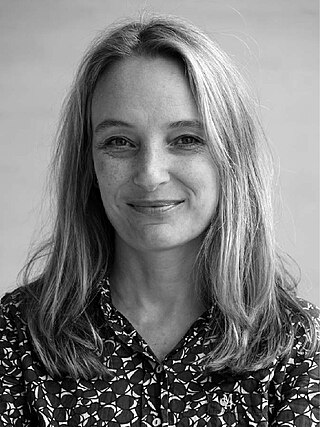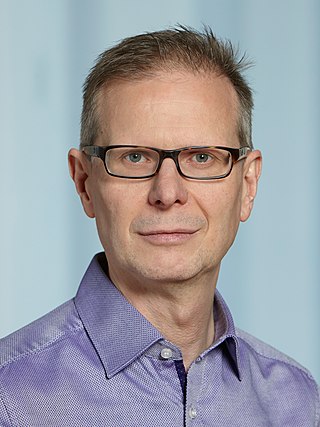Nicole King is an American biologist and faculty member at the University of California, Berkeley in molecular and cell biology and integrative biology. She was awarded a MacArthur Fellowship in 2005. She has been an investigator with the Howard Hughes Medical Institute (HHMI) since 2013.

Naomi E. Pierce is an American entomologist and evolutionary biologist who studies plant-herbivore coevolution and is a world authority on butterflies. She is the Hessel Professor of Biology and Curator of Lepidoptera in the Department of Organismic and Evolutionary Biology at Harvard University.
Leah Krubitzer is an American neuroscientist, Professor of Psychology at University of California, Davis, and head of the Laboratory of Evolutionary Neurobiology. Her research interests center on how complex brains in mammals evolve from simpler forms. To do this, she focuses on anatomical connections and electrophysiological characteristics of neurons in the neocortex. Using comparative studies, she determines which features of the neocortex are shared by all mammals and how new features of the neocortex have evolved. This allows her to reconstruct evolutionary phylogenies of the neocortex together with their relationship to functional changes. Thus, her work aims to explain the diversity in mammalian behavioral and perceptual abilities by investigating how evolutionarily old developmental mechanisms constrain evolutionary change while also providing the variation needed for the evolution of the diversity of brains found in mammals.

Detlef Weigel is a German American scientist working at the interface of developmental and evolutionary biology.

Professor Rudolf Konrad Allemann is a Distinguished Research Professor and Pro Vice-Chancellor International and Student Recruitment and Head of the College of Physical Sciences and Engineering at Cardiff University. Allemann joined Cardiff University in 2005, after working at the University of Birmingham, the Swiss Federal Institute of Technology ETH Zurich and the UK MRC National Institute for Medical Research at Mill Hill. He was previously Head of the School of Chemistry at Cardiff University until April 2017.

The Ernst Schering Prize is awarded annually by the Ernst Schering Foundation for especially outstanding basic research in the fields of medicine, biology or chemistry anywhere in the world. Established in 1991 by the Ernst Schering Research Foundation, and named after the German apothecary and industrialist, Ernst Christian Friedrich Schering, who founded the Schering Corporation, the prize is now worth €50,000.

Nicola Ann Spaldin FRS is professor of materials science at ETH Zurich, known for her pioneering research on multiferroics.

Cassandra Extavour is a Canadian geneticist, researcher of organismic and evolutionary biology, professor of molecular and cell biology at Harvard University, and a classical singer. Her research has focused on evolutionary and developmental genetics. She is known for demonstrating that germ cells engage in cell to cell competition before becoming a gamete, which indicates that natural selection can affect and change genetic material before adult sex reproduction takes place. She was also the Director of EDEN, a National Science Foundation-funded research collaborative that encouraged scientists working on organisms other than the standard lab model organisms to share protocols and techniques.

Tanja Stadler is a mathematician and professor of computational evolution at the Swiss Federal Institute of Technology. She’s the current president of the Swiss Scientific Advisory Panel COVID-19.

Christophe Dessimoz is a Swiss National Science Foundation (SNSF) Professor at the University of Lausanne, Associate Professor at University College London and a group leader at the Swiss Institute of Bioinformatics. He was awarded the Overton Prize in 2019 for his contributions to computational biology. Starting in April 2022, he will be joint executive director of the SIB Swiss Institute of Bioinformatics, along with Ron Appel.

Tanya M. Smith is a human evolutionary biologist, and Professor at the Australian Research Centre for Human Evolution, Griffith University.
Vivian Irish is an American evolutionary biologist. She is currently Chair & Eaton Professor of Molecular, Cellular and Developmental Biology and Professor of Ecology and Evolutionary Biology at Yale University. Her research focuses on floral development. She was president of Society for Developmental Biology in 2012 and currently serves as an editor for the journals Developmental Biology and Evolution & Development.
Carmen Birchmeier-Kohler is a German geneticist and developmental biologist. The focus of her research group is the development of embryonic tissues and the nervous system. The model organism for her investigations is the mouse.

Sabine Werner is a German biochemist and professor.

Eilika Weber-Ban is a German biochemist. Her research considers protein degradation pathways. She was elected to the European Molecular Biology Organization in 2021.

Ulrike Lohmann is a climate researcher and professor for atmospheric physics at the ETH Zurich. She is known for her research on aerosol particles in clouds.

Renato Renner is a Swiss professor for Theoretical Physics at the Swiss Federal Institute of Technology (ETH) in Zurich, where he is head of the Research Group for Quantum Information Theory. His research interests include Quantum Information and Computation, the Foundations of Quantum Physics and Quantum thermodynamics.

Günther Dissertori is an Italian physicist, scientist, professor for particle physics and rector at ETH Zurich.
Paola Picotti is an Italian biologist who is Professor for Molecular Systems Biology at ETH Zürich. She is Deputy Head of the Institute for Molecular Systems Biology. Her research investigates how the conformational changes of proteins impact cellular networks. She was awarded the 2020 ETH Zürich Rössler Prize and the 2019 EMBO Gold Medal.
Geneviève Défago is a former lecturer in phytopathology at the Institute of Plant Sciences in the discipline of phytomedicine at ETH Zurich, the Swiss Federal Institute of Technology in Zurich, Switzerland. She was the director of interuniversity and interdisciplinary projects devoted to biological control and biosafety. In 1990, she was awarded the title of Professor. She retired at the end of July 2006.














